| Listing 1 - 10 of 173 | << page >> |
Sort by
|
Book
ISBN: 1281979465 9786611979461 9048508967 9789048508969 9789056292560 9056292560 9781281979469 6611979468 Year: 2002 Publisher: Amsterdam Vossiuspers
Abstract | Keywords | Export | Availability | Bookmark
 Loading...
Loading...Choose an application
- Reference Manager
- EndNote
- RefWorks (Direct export to RefWorks)
September 11 Terrorist Attacks, 2001. --- Aggression (International law) --- Self-defense (International law) --- Intervention (International law) --- Military intervention --- Diplomacy --- International law --- Neutrality --- 9/11 Terrorist Attacks, 2001 --- 911 Terrorist Attacks, 2001 --- Attack on America, 2001 (September 11 Terrorist Attacks) --- Nine-Eleven Terrorist Attacks, 2001 --- Pentagon-World Trade Center Terrorist Attacks, 2001 --- Sept. 11 Terrorist Attacks, 2001 --- September 11 Terror Attacks, 2001 --- September 11 Terrorism, 2001 --- Terrorist Attacks, September 11, 2001 --- World Trade Center-Pentagon Terrorist Attacks, 2001 --- Hijacking of aircraft --- Terrorism
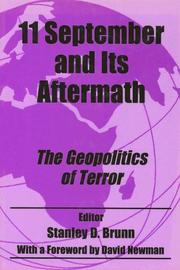
ISBN: 1135756015 0429234643 0203646606 1280138815 1135756023 9780203646601 9780714655727 0714655724 9780714684543 0714684546 9786610138814 6610138818 0714684546 0714655724 9781135756024 9781135755973 9781135756017 9780429234644 9781280138812 Year: 2004 Publisher: London Cass
Abstract | Keywords | Export | Availability | Bookmark
 Loading...
Loading...Choose an application
- Reference Manager
- EndNote
- RefWorks (Direct export to RefWorks)
A series of 11 original essays discussing the impacts of 11 September 2001 on foreign policies and international relations. The authors draw from a variety of perspectives to discuss America and emerging world orders, terrorism, environmental security, civil society and the visual and print media.
September 11 Terrorist Attacks, 2001. --- World politics --- Geopolitics. --- 9/11 Terrorist Attacks, 2001 --- 911 Terrorist Attacks, 2001 --- Attack on America, 2001 (September 11 Terrorist Attacks) --- Nine-Eleven Terrorist Attacks, 2001 --- Pentagon-World Trade Center Terrorist Attacks, 2001 --- Sept. 11 Terrorist Attacks, 2001 --- September 11 Terror Attacks, 2001 --- September 11 Terrorism, 2001 --- Terrorist Attacks, September 11, 2001 --- World Trade Center-Pentagon Terrorist Attacks, 2001 --- Hijacking of aircraft --- Terrorism --- International relations. Foreign policy --- Polemology
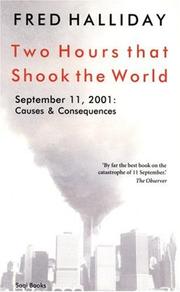
Abstract | Keywords | Export | Availability | Bookmark
 Loading...
Loading...Choose an application
- Reference Manager
- EndNote
- RefWorks (Direct export to RefWorks)
Islam --- International relations. Foreign policy --- Polemology --- Islam and politics. --- Islamic fundamentalism. --- September 11 Terrorist Attacks, 2001. --- Islamic countries --- Middle East --- Asia, Central --- Politics and government --- Islam and politics --- Islamic fundamentalism --- September 11 Terrorist Attacks, 2001 --- 9/11 Terrorist Attacks, 2001 --- 911 Terrorist Attacks, 2001 --- Attack on America, 2001 (September 11 Terrorist Attacks) --- Nine-Eleven Terrorist Attacks, 2001 --- Pentagon-World Trade Center Terrorist Attacks, 2001 --- Sept. 11 Terrorist Attacks, 2001 --- September 11 Terror Attacks, 2001 --- September 11 Terrorism, 2001 --- Terrorist Attacks, September 11, 2001 --- World Trade Center-Pentagon Terrorist Attacks, 2001 --- Hijacking of aircraft --- Terrorism --- Fundamentalism, Islamic --- Islamism --- Religious fundamentalism --- Politics and Islam --- Political science --- Political aspects --- Muslim countries
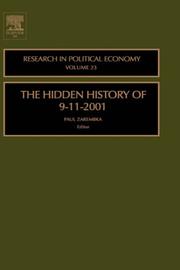
ISBN: 9781849504089 1849504083 0762313056 9786610642915 1280642912 0080463029 9780762313051 9780080463025 Year: 2006 Publisher: Amsterdam Elsevier
Abstract | Keywords | Export | Availability | Bookmark
 Loading...
Loading...Choose an application
- Reference Manager
- EndNote
- RefWorks (Direct export to RefWorks)
This important volume brings together rigorous scholarship on the events of 9-11-2001, and assesses whether the truth has been told by the U.S. government. The lead chapter shows that eleven of FBI-named Arabic hijackers could not have been on the planes, while the Dulles airport videotape - essentially being the case that hijackers boarded flights - has very serious authentication problems. The next three chapters examine insider trading beforehand and the 9-11 flights themselves, then the evidence - based partly upon newly-released reports of more than 500 firefighters - permitting a conclusion that three buildings in the WTC complex were brought down by demolition, followed by discussion of scheduled military drills which confused standard operating procedures, and concluding with a surprising connection to the death of Senator Wellstone, leading critique of the Bush administration. The third part opens with a chapter examining the connection between Al-Qaeda and Western covert operations, showing how Al-Qaeda is inseparably connected to the latter. The following chapter shows that Machiavellian state terrorism is rather common and not at all unlikely for 9-11, while the following examines how the 9-11 Commission wrote its own history, rather than reporting and analyzing true history. The rise of Islamophobia as an ideological force to sustain U.S. imperialism is then introduced. The final chapter, while not explicit, offers a possible connection to the process of undermining pensions in the U.K. The volume can be seen as a definitive, scholarly explanation of 9-11 as a world-changing event.
Economic history --- Economics. --- Economic theory --- Political economy --- Social sciences --- Economic man --- United States --- Economic conditions --- Economic schools --- Political Science --- History --- History of the Americas. --- 21st century history: from c 2000 -. --- September 11 Terrorist Attacks, 2001. --- General. --- 9/11 Terrorist Attacks, 2001 --- 911 Terrorist Attacks, 2001 --- Attack on America, 2001 (September 11 Terrorist Attacks) --- Nine-Eleven Terrorist Attacks, 2001 --- Pentagon-World Trade Center Terrorist Attacks, 2001 --- Sept. 11 Terrorist Attacks, 2001 --- September 11 Terror Attacks, 2001 --- September 11 Terrorism, 2001 --- Terrorist Attacks, September 11, 2001 --- World Trade Center-Pentagon Terrorist Attacks, 2001 --- Hijacking of aircraft --- Terrorism
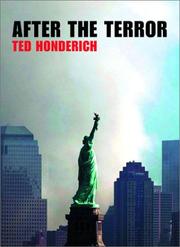
ISBN: 0585443653 9780585443652 0748616675 9780748616671 Year: 2002 Publisher: [Place of publication not identified] Edinburgh University Press
Abstract | Keywords | Export | Availability | Bookmark
 Loading...
Loading...Choose an application
- Reference Manager
- EndNote
- RefWorks (Direct export to RefWorks)
GBS_insertPreviewButtonPopup('ISBN:9780748616688);'To be on an airliner and look around and see the people and be able to stick to the plan of flying it into a skyscraper is to be hideous, and to persist if they come to know the plan is to be monstrous.''For the 3,000 deaths there are lines of responsibility into the past, as real as chains of command, containing earlier and later perpetrators. We in our democracies are in them, and in particular those of us who have got themselves into our governments.'After The TerrorThis philosophical and moral reflection describes two worlds - ours of good lives and another of bad lives - and questions our complicity in allowing the bad lives to happen. With what morality are we to think of this? And of September 11th, and about our counter-attack, and what to do now?After the Terror is not moral philosophy detached from reality. It enquires into the 'natural fact' of morality and the worked-out moralities of philosophers. It reaches to the moral core of our lives. Ted Honderich asks why the events of September 11th were wrong and what terrorism tells us about ourselves and our obligations. He does not respect the moral confidence of our leaders and others. He defends a morality of humanity that requires us to think about our lives, and to act up against our democratic governments.Key FeaturesA serious work of philosophy that looks at the moral issues in the aftermath of September 11thWritten by a famous philosopher who is widely publishedA courageous, sceptical book that asks tough questions and makes us think about our valuesWritten with passion, conviction and honesty"
Social ethics --- September 11 Terrorist Attacks, 2001 --- Sociology & Social History --- Social Sciences --- Social Change --- 9/11 Terrorist Attacks, 2001 --- 911 Terrorist Attacks, 2001 --- Attack on America, 2001 (September 11 Terrorist Attacks) --- Nine-Eleven Terrorist Attacks, 2001 --- Pentagon-World Trade Center Terrorist Attacks, 2001 --- Sept. 11 Terrorist Attacks, 2001 --- September 11 Terror Attacks, 2001 --- September 11 Terrorism, 2001 --- Terrorist Attacks, September 11, 2001 --- World Trade Center-Pentagon Terrorist Attacks, 2001 --- Hijacking of aircraft --- Terrorism --- Ethics --- Social problems --- Sociology --- Moral and ethical aspects --- Political philosophy. Social philosophy --- Moral and ethical aspects.
Periodical
Abstract | Keywords | Export | Availability | Bookmark
 Loading...
Loading...Choose an application
- Reference Manager
- EndNote
- RefWorks (Direct export to RefWorks)
Polemology --- Terrorism --- Terrorisme --- Periodicals. --- Périodiques --- Terrorism. --- Acts of terrorism --- Attacks, Terrorist --- Global terrorism --- International terrorism --- Political terrorism --- Terror attacks --- Terrorist acts --- Terrorist attacks --- World terrorism --- Direct action --- Insurgency --- Political crimes and offenses --- Subversive activities --- Political violence --- Terror --- Polemologie
Book
ISBN: 9780231170000 9780231539128 0231539126 0231170009 Year: 2015 Publisher: New York : ColumbiaUniversity Press,
Abstract | Keywords | Export | Availability | Bookmark
 Loading...
Loading...Choose an application
- Reference Manager
- EndNote
- RefWorks (Direct export to RefWorks)
The counterinsurgency (COIN) paradigm dominates military and political conduct in contemporary Western strategic thought. It assumes future wars will unfold as "low intensity" conflicts within rather than between states, requiring specialized military training and techniques. COIN is understood as a logical, effective, and democratically palatable method for confronting insurgency-a discrete set of practices that, through the actions of knowledgeable soldiers and under the guidance of an expert elite, creates lasting results. Through an extensive investigation into COIN's theories, methods, and outcomes, this book undermines enduring claims about COIN's success while revealing its hidden meanings and effects. Interrogating the relationship between counterinsurgency and war, the authors question the supposed uniqueness of COIN's attributes and try to resolve the puzzle of its intellectual identity. Is COIN a strategy, a doctrine, a theory, a military practice, or something else? Their analysis ultimately exposes a critical paradox within COIN: while it ignores the vital political dimensions of war, it is nevertheless the product of a misplaced ideological faith in modernization.
Polemology --- Counterinsurgency --- Terrorism --- Acts of terrorism --- Attacks, Terrorist --- Global terrorism --- International terrorism --- Political terrorism --- Terror attacks --- Terrorist acts --- Terrorist attacks --- World terrorism --- Direct action --- Insurgency --- Political crimes and offenses --- Subversive activities --- Political violence --- Terror --- Counterguerrilla warfare --- Guerrilla warfare --- History
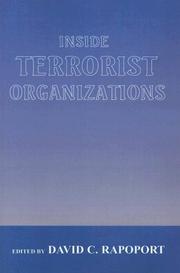
ISBN: 0714681792 9780714681795 9781315040004 9781135311780 9781135311858 9781135311926 9781138154216 Year: 2001 Publisher: London Cass
Abstract | Keywords | Export | Availability | Bookmark
 Loading...
Loading...Choose an application
- Reference Manager
- EndNote
- RefWorks (Direct export to RefWorks)
International movements --- Terrorism --- Terrorists --- Acts of terrorism --- Attacks, Terrorist --- Global terrorism --- International terrorism --- Political terrorism --- Terror attacks --- Terrorist acts --- Terrorist attacks --- World terrorism --- Direct action --- Insurgency --- Political crimes and offenses --- Subversive activities --- Political violence --- Terror --- Psychology
Book
ISBN: 9780415780513 9780415780506 9780203840566 0415780500 0415780519 9780415577496 0415577497 Year: 2011 Publisher: Abingdon: Routledge,
Abstract | Keywords | Export | Availability | Bookmark
 Loading...
Loading...Choose an application
- Reference Manager
- EndNote
- RefWorks (Direct export to RefWorks)
This volume comprises some of the key essays by Professor Crenshaw, from 1972 to the present-day, on the causes, processes and consequences of terrorism.Since the early 1970s, scholars and practitioners have tried to explain terrorism and to assess the effectiveness of government responses to the threat. From its beginnings in a small handful of analytical studies, the research field has expanded to thousands of entries, with an enormous spike following the 9/11 attacks. The field of terrorism studies is now impressive in terms of quantity, scope, and variety. Professor Crenshaw had studied terrorism since the late 1960s, well before it was topical, and this selection of her work represents the development of her thought over time in four areas:defining terrorism and identifying its causesthe different methods used to explain terrorism, including strategic, organisational and psychological approacheshow campaigns of terrorism endhow governments can effectively contribute to the ending of terrorism.This collection of essays by one of the pioneering thinkers in the field of terrorism studies will be essential reading for all students of political violence and terrorism, security studies and IR/politics in general.
Terrorism. --- Polemology --- Terrorism --- Acts of terrorism --- Attacks, Terrorist --- Global terrorism --- International terrorism --- Political terrorism --- Terror attacks --- Terrorist acts --- Terrorist attacks --- World terrorism --- Direct action --- Insurgency --- Political crimes and offenses --- Subversive activities --- Political violence --- Terror --- Terrorisme. --- Terrorisme --- Lutte contre.
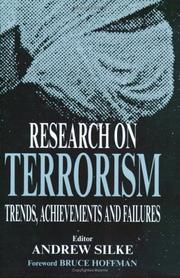
ISBN: 1135763372 0429233760 1280267356 0203500970 9786610267354 9780203500972 071465311X 9780714653112 9780714682730 071468273X 071468273X 9781135763374 9780429233760 9781280267352 6610267359 9781135763329 9781135763367 1135763364 Year: 2006 Publisher: London Frank Cass
Abstract | Keywords | Export | Availability | Bookmark
 Loading...
Loading...Choose an application
- Reference Manager
- EndNote
- RefWorks (Direct export to RefWorks)
This book brings together leading international experts in the world of terrorism research and counterterrorism policy-making. It has three clear areas of focus:it looks at current issues and trends in terrorism researchit explores how contemporary research on terrorism is focused and conductedit examines how this research impacts in terms of counterterrorism policy and practice. This is essential reading for all students of politics and security studies and scholars with an interest in terrorism and policy-making.
Terrorism --- Terrorism. --- Acts of terrorism --- Attacks, Terrorist --- Global terrorism --- International terrorism --- Political terrorism --- Terror attacks --- Terrorist acts --- Terrorist attacks --- World terrorism --- Direct action --- Insurgency --- Political crimes and offenses --- Subversive activities --- Political violence --- Terror --- Research --- Methodology. --- Polemology
| Listing 1 - 10 of 173 | << page >> |
Sort by
|

 Search
Search Feedback
Feedback About UniCat
About UniCat  Help
Help News
News